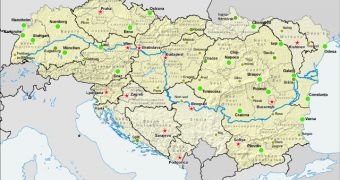Croatian authorities have set forth a plan to regulate the Danube with embankments, stones and groins. Conservationists have already began protesting the measures violently, as implementing them would literally mean destroying the river and its ecosystem.
The plan is not aimed at the Danube exclusively, but rather at all the larger rivers that pass through or originate in Croatia. Representatives from national NGO, EuroNatur, and the World Wildlife Fund for Nature (WWF) have complained to the European Union against the plans.
According to the documents they set forth, the Croatian Water Management Authority plans to go against European norms regarding the regulation of flowing waters on national territories.
The Croatian plans would have most likely never drawn such attention had the Danube not been one of the largest and multi-national river in the entire world. It pass through numerous countries, before finally flowing into the Black Sea, through the impressive Danube Delta.
The river originates in Germany, and passes through Austria, Slovakia, Hungary, Croatia, Serbia, Bulgaria, Moldova, the Ukraine, before reaching the end of its course in Romania.
Scientists say that river plays an important role in supporting a large number of ecosystems and habitats along its banks, whose Croatian sections are currently being threatened with destruction. National authorities in the central European country want to turn them into a canal.
“We are very much concerned that new planned river regulation projects along all major rivers in Croatia are threatening unique natural areas and counteracting efforts of the EU to bring water management in line with EU policy and law,” explains Arno Mohl.
“Specifically, we are concerned about the planned large-scale river regulation schemes, sediment extraction and irrigation projects along the Danube, Drava, Mura, Sava and Neretva Rivers,” adds the expert, who is the principal freshwater expert for WWF Austria.
“These are river management plans of last century. European river authorities are suggesting [more] ecologically acceptable methods of river management that leave more space for the rivers,” he says.
“They are doing this because we now realize that a naturally functioning river not only has more life than a canal, but it also provides natural mechanisms to better deal with droughts and floods,” the WWF official goes on to say.
“The regulation plans are the biggest attack on Croatian and European natural heritage since the country became independent,” a joint statement from Croatian NGO says.
“We urge the EU Commission to help stop this old fashioned way of river management and urge the Croatian government to impose a moratorium on these plans,” the declaration goes on to say.

 14 DAY TRIAL //
14 DAY TRIAL //